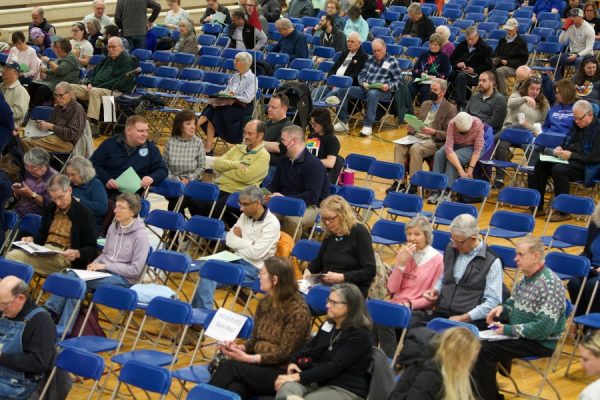School Committee Meeting discusses scheduling and distance learning implementations
Visualization of the COVID-19 virus.
When Governor Baker announced an extension for all schools in Massachusetts until May 4, showing the continuing effects of the COVID-19 among Westford and its citizens, the Westford School Committee initiated a virtual School Committee meeting on March 30 to continue the conversation surrounding scheduling and future learning plans for the Westford Public Schools.
Kerry Clery, the Westford Public Schools Assistant Superintendent, stated that the school committee is prepared for this prospect but overall will continue to plan for school starting again on May 4.
Additionally, Clery emphasized the 981 confirmed COVID-19 cases in Middlesex County, 14 of which are in Westford.
“This is not an education crisis, this is a health crisis. And so we as educators are shifting our approach to try to continue to reach students within the realm of this [situation],” Clery said.
The current learning plan has been in place since March 6, and provides optional activity boards for students to work on from home. However, starting April 6, mandatory activities will be assigned by teachers and a distance learning plan will be put in place, with the goal of further progressing students’ education throughout their time away from school.
Westford’s remote learning plan can be divided up into three separate chunks. The first chunk allows teachers to set up online classes through sites such as Google Meet and introduce weekly topics for each of their classes. Videos can also be made ahead of time in order for students to learn at their own pace, although this technique will be more commonly used throughout the elementary schools.
The second chunk consists of follow-up activities that are assigned to correspond with the virtual lessons. Ideally, students can take the information they’ve learned through the instructional voice-call sessions, and then apply them to their assignments.
Students are given the opportunity to receive extra help and ask additional questions during what will be called Upper-Level Office hours. This final chunk allows teachers to organize optional calls for small groups or one-on-one sessions in order to further aid struggling students.
These three chunks comprise Westford’s distance learning plan, which will include a grading structure that follows a “credit” or “no credit” system rather than the traditional grading method. Seniors will also be expected to partake in the new digital learning plan due to the recent cancellation of Capstones. However, if the Massachusetts school closures are extended beyond May 4, Seniors’ last assignments will be given towards the end of May, as opposed to June.
However, Clery added that there are many variables to consider with the new learning plan, as there are families who may not have access to more than one computer, as well as students with disabilities. Those students placed on IEPs are also taken into account, as students in that category are often given additional work from their Special Education teacher. Some are concerned that the workload for these students will become greater than the rest of their peers.
One alternative would be to set up private sessions that allow the students and their IEP teachers to work on activities together, while another option would ensure that work is only required from their special education sessions, rather than a combination of work from all of these students’ classes.
“While there are so many people who feel that they are available and ready to learn […] we [Westford Academy] are a public school and have to account for all these situations. There are probably many other obstacles that I either didn’t mention or we [the district] haven’t even thought of,” Clery said.
With the consideration that not all families have access to devices, the district offered to provide Chromebooks to those who responded to a recently sent out survey. Clery said that in addition to ten previously loaned devices, 121 more forms have been submitted with a request.
The distribution will occur at the Millennium School on Thursday, April 2nd from 9:30 AM to 1:30 PM with the help of staff and volunteers. To maintain social distancing, those in need of a device will be allotted a time to drive up to the school while a runner leaves the Chromebook on a table for the parent.
“There’s no direct handoff. We’re maintaining social distancing through[out] this entire process. The runner grabs the Chromebook, brings it outside, leaves it on the table and steps away. [So, the] parent can get out of the car and take it off the table,” Clery said.
Another topic discussed during the meeting was attendance. Teachers will use the completion of assignments to determine if a student is present or absent. The third chunk of the remote learning plan — office hours — will not count towards attendance due to its optionality.
“Each week the work submission will account for the attendance […] We are not going to hold attendance for the office hours because those are optional for students,” Clery said.
As for teacher remote learning preparation, Clery mentioned they are training this week to be accustomed to course expectations. To address technological issues teachers may experience, Director of Digital Learning Julie Boudreau created a website with tutorials on how to operate applications such as Google Classroom and Google Hangouts.
“In terms of teacher training, that’s actually what they’re doing all week this week […] Julie Boudreau has created a website with basic clear succinct information in each of those three chunks […] It’s differentiated that teachers know the expectations and can access whatever resources that are provided on one nice, neat, brand new website for them,” Clery said.
Another issue discussed was what will occur when school is back in session. Clery mentioned school will progress as it normally would with assessments and grades.
“Things will go back to normal at that point and obviously we’ll just have to adjust the teaching through the end of the year based on the blip that has occurred since March 13,” Clery said.
As for April break, the district is still exploring various options. When looking at it from a learning perspective, it isn’t effective to institute remote learning for two weeks and then canceling it for a week of vacation, but, on the other hand, April break has traditionally been the busiest. A possible solution the district is considering is making distance learning optional just for that week, but with factors such as trip cancellations, the district is confused on how to tackle this issue. In order to get some resident input, a survey may be sent to hear parents’ opinions.
For the May 5 voting day, there are two different options. If schools are back in session by May 4, then May 5 will be canceled considering elections continue. On the other hand, if school cancellation extends past May 4, then voting will be canceled and the last day would be June 22 instead of June 23. As for now, the Board is still discussing other possibilities.
Concluding the meeting, Olsen asked everyone to remain calm as the district tries to respond to such an unprecedented situation.
“We […] just ask for people’s patience […] everything’s just gonna be an iterative where we’re going to learn as we go along. […] We’re trying to adapt and recalibrate as quickly as possible,” Superintendent Bill Olsen said.






